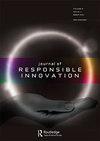社会实验室作为参与性研究的实验参与方法
IF 4.1
1区 哲学
Q1 ETHICS
引用次数: 5
摘要
社会实验室的方法如何支持参与性研究?本文对19个已实施的社会实验室的经验进行了基于证据的分析,应用体验式学习周期来探讨如何在欧盟委员会的Horizon2020研究资助计划中诱导负责任的研究和创新。它着眼于社会实验室的潜力,允许参与解决社会挑战的研究和创新,并将实证结果与科学社会实验室方法的理论概念化进行对比。它讨论了参与的驱动因素和障碍,并提供了实验参与对实验室背景下参与的影响的证据,并通过其中一些实验室的具体例子加以证实。本文章由计算机程序翻译,如有差异,请以英文原文为准。
The social lab as a method for experimental engagement in participatory research
How does the Social Lab methodology support participatory research? This paper provides an evidence-based analysis of experiences of 19 implemented Social Labs applying experiential learning cycles on the question of how to induce Responsible Research and Innovation in the Horizon2020 research funding scheme of the European Commission and beyond. It looks at the potentials of Social Labs to allow participation in research and innovation addressing societal challenges and contrasts empirical results with the theoretical conceptualisation of a scienti fi c Social Lab methodology. It discusses drivers and barriers of engagement, and provides evidence for the impacts of experimental engagement on participation in the context of the labs, substantiated by concrete examples from some of these labs.
求助全文
通过发布文献求助,成功后即可免费获取论文全文。
去求助
来源期刊

Journal of Responsible Innovation
Multiple-
CiteScore
8.60
自引率
20.50%
发文量
26
审稿时长
12 weeks
期刊介绍:
The Journal of Responsible Innovation (JRI) provides a forum for discussions of the normative assessment and governance of knowledge-based innovation. JRI offers humanists, social scientists, policy analysts and legal scholars, and natural scientists and engineers an opportunity to articulate, strengthen, and critique the relations among approaches to responsible innovation, thus giving further shape to a newly emerging community of research and practice. These approaches include ethics, technology assessment, governance, sustainability, socio-technical integration, and others. JRI intends responsible innovation to be inclusive of such terms as responsible development and sustainable development, and the journal invites comparisons and contrasts among such concepts. While issues of risk and environmental health and safety are relevant, JRI especially encourages attention to the assessment of the broader and more subtle human and social dimensions of innovation—including moral, cultural, political, and religious dimensions, social risk, and sustainability addressed in a systemic fashion.
 求助内容:
求助内容: 应助结果提醒方式:
应助结果提醒方式:


